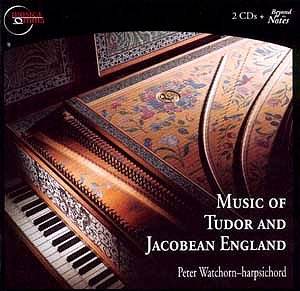

MUSIC OF TUDOR AND JACOBEAN ENGLAND
CD 1 [51.17]
1. Anonymous Passamezzo Pavan (Tisdale's Virginal Book-TVB)
2. Anonymous-Passamezzo Galliard (TVB)
3. William Randall-Johnson's Medley
(TVB)
4. Dowland-Lachrymae (TVB)
5. Dowland-Galliard: Can she excuse?
(TVB)
6. William Byrd-La Volta (Fitzwilliam
Virginal Book–FWVB)
7. John Bull-In nomine XII (Musica
Britannica-MB 31)
8. Anonymous-Chi passa (Dublin Virginal Book-DVB)
9. Peter Philips-Amarilli di Julio
Romano (FWVB)
10. William Byrd-The Third Pavane
(My Lady Nevell's Book-Nevell)
11. The Third Galliard (Nevell)
12. Tregian's Pavane (MB 60a)
13. Tregian's Galliard (MB 60b)
14. Anonymous-Variations on the Romanesca (DVB)
15. My Lady Carey's Dompe (Royal. App. 58)
16. Galliard (Nevell, MB 3b)
CD 2 [41.31]
1. Orlando Gibbons-Pavan in g (MB
16)
2. John Bull-Dr.
Bull's My Selfe (FWVB)
3. Orlando Gibbons-Pavan in a (MB
17)
4. John Bull-Vaulting Galliard (MB
90)
5. William Byrd-Pavan in d (MB 52a)
6. William Byrd-Galliard in d (MB
52b)
7. Orlando Gibbons-The Italian Ground
(MB 27)
8. John Munday-Robin (FWVB)(MB 27)
9. Anonymous-Pavana (Mall sims, FWVB
XVI)
10. William Byrd-Lord
Willobies Welcome Home (Nevell, MB 7)
11. William Tisdale-Mrs.
Katherin Tregian's Paven (FWVB)
12. William Byrd-The
Tenth Pavian: Mr. W. Peter (Nevell, MB 3a)
CD 3 [23.55]
Beyond the Notes - The Virginalists: An English Phenomenon, Howard
Schott ,
![]() Peter Watchorn, harpsichord
Peter Watchorn, harpsichord
Rec: June 15, 1996 Southern Vermont College, Bennington, VT.
![]() MUSICA OMNIA MO 0112
[92.48 + 27.39]
MUSICA OMNIA MO 0112
[92.48 + 27.39]